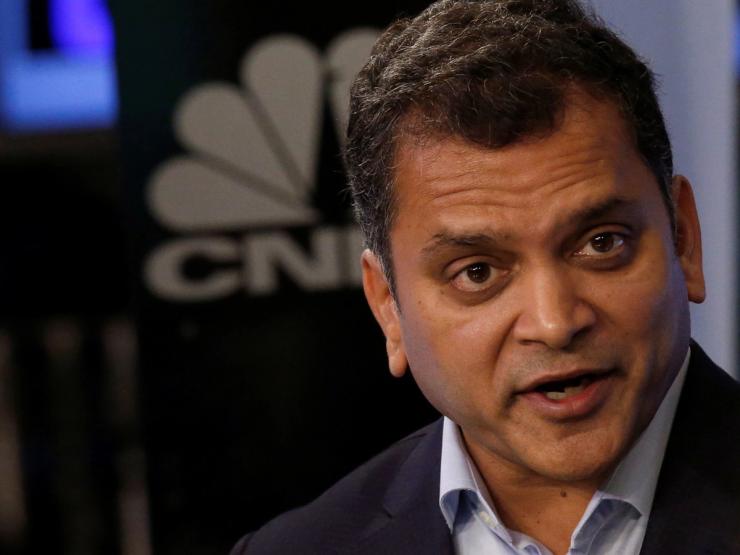The Signal Insight
e.l.f. Beauty is a cosmetics industry phenomenon, which started in 2004 “to make the best of beauty accessible to every eye, lip, and face.” It is celebrating a 26-quarter run of revenue and market share growth, driven by accessible pricing, high-speed product launches, and playful social media marketing that has won over legions of young consumers.
Tarang Amin, e.l.f.‘s chairman and CEO since 2014, doubled down on that audience in May by buying rhode, a skincare brand from the model Hailey Bieber, for upwards of $800 million.
e.l.f. likes to say that it is “a different type of company,” offering stock to all employees and advocating diversity at a time when a backlash to DEI has silenced many companies. Amin, a Procter & Gamble-trained former general manager of Clorox’s litter, food, and charcoal businesses, has challenged his peers with provocative campaigns highlighting the lack of diversity in corporate America. One, called “So Many Dicks,” pointed out that men called Dick (or Richard, Rich, or Rick) outnumber several underrepresented groups on US boards.
But Amin has also encountered the commercial realities that other brands face. Last month, e.l.f. raised prices by a dollar, announcing the news with a TikTok video featuring animated products lamenting the “tariffying” reason for its decision.
At its earnings announcement a few days later, Amin told Wall Street that e.l.f. could not guide investors on what its full-year results might be, because of “the wide range of potential outcomes” from President Donald Trump’s profit-denting trade policies. Its stock has fallen 40% from its peak last year but remains six times higher than the price at which it listed in 2016.
Here’s how Amin balances advocacy, external pressures, and the bottom line.
This interview has been condensed and edited for clarity.
Andrew Edgecliffe-Johnson: What has driven the growth of e.l.f.?
Tarang Amin: No. 1 is the value proposition. As an example, we launched [the] Vitamin C + E + Ferulic Serum last quarter. It’s a higher price point than most e.l.f. products, at $17, but the only other thing like it in the market is a prestige item at $185. The second is that we have a unique innovation engine that can replicate, over and over, this ability of taking inspiration, putting our twist on it, and introducing this great value. And the third is a disruptive marketing engine, our ability to engage and entertain a community.
Those three consistent themes have really propelled our story, but the biggest advantage we have is a passionate team of owners and a high-performance team culture. We’re unique in our space in granting equity to every single employee every year, being explicit that we want meaningful wealth creation for every member on the team. And we train people on how to do healthy conflict, giving pinpointed, specific feedback in real time, and [expecting] mutual accountability. The true engine is the people and the culture.
Why did you decide to give every employee equity?
Our family story is we’re immigrants, and the way we rose was as entrepreneurs. When I was 14, we sold our house, took every penny we had, and bought our first motel on Route 1 in Alexandria, Virginia. We moved right into the manager’s apartment, and our business model was finding these distressed properties and fixing them up. We’re good operators, and kept building a business, so I saw at a very young age the power of ownership.
My first CEO role was at Schiff Nutrition, and that was the only argument I had with our private equity backers. I said, “I want to give equity to everyone.” And they said, “No, that’s not how it works.” And I said, “All right, why don’t I do this? I’ll make [my compensation] all performance-based, and then you can take the equity you’re going to give me, and we can give it to all of our employees. And then if we hit certain targets, I’ll get paid.” I think we made them seven times their money. Everyone saw the benefit of equity.
[At e.l.f., we can issue up to] 2% [of our equity] for our employees. Most investors will take that 2% dilution for the results and the level of engagement.
You talk about creating not just a different type of beauty company, but a different type of company. Can you define what you mean?
It’s about building brands that disrupt norms, shape culture, and connect communities through positivity, inclusivity, and accessibility. Now, that’s a mouthful, but each of those words is important.
We’re big believers that if your team represents the community you serve, you will have better results. So our workforce is 74% women, 76% Gen Z and Millennial, 44% diverse. They are our consumers. And a lot of people [ask], “Where do you get your insights?” We listen to our community, like many companies will do, but our team is our community.
I do a product review every two weeks, and I make it an open ticket. Some people were horrified when I first said anybody in the company can join. But that’s the one meeting I will gladly keep my Zoom screen open for, and all I’m doing is looking at the chat. It’s this notion [that you should have] a team that represents your community, and then empower them to make decisions.
What has the response been like from your fellow CEOs to your “Change the Board Game” and “So Many Dicks” campaign?
I would have thought I would have gotten some pushback, or some CEOs that would have been openly hostile to what we’re doing, but we’ve made the case for how [diversity ties to performance]. Homogeneous teams do not perform as well as diverse teams, and I’ve never met a CEO who didn’t want the most talented workforce they could get. We’re proud to say we’re purpose-led and results-driven. I’m a little perplexed by when that became a debate of picking one or the other, but we’re proof that they both go hand in hand.
Your global $1 price increase — only your third in 21 years — went into effect August 1. You’re known for your accessible pricing, so this is pretty core. Can you talk me through how you made the decision?
75% of our production is in China, where we’re currently subject to a 55% tariff. It’s been as high as 170% and so those costs are real. We never [raise prices] unless it’s for some major external factor, and our approach is to be very transparent with our community. So we told them, we’re going to take prices up $1 because of the cost that we’re facing. [We had a] very strong positive reaction, because our community knows us for the transparency we have with them. There’s zero distance between us, the C-suite, and our community. In fact, my CMO sometimes terrorizes me by dragging me on TikTok Live and [telling e.l.f.’s social media followers], ‘Hey, you got the big boss. Tell him what you want.’ They’re not shy. In the chat, they’ll go for it. So we ended up deciding, if you’re going to have a genuine, transparent relationship and conversation [with your] community, you can’t just communicate what’s good.
In the rhode transaction, you’re paying four or five times its sales in the preceding 12 months. Do you value celebrity brands on different metrics?
No, we don’t. We’ve typically avoided celebrity brands given the volatility of them, but we don’t view rhode as a celebrity brand. Even though Hailey Bieber’s a celebrity, I view her as one of the most thoughtful founders I’ve ever met. Her instincts are great, [she has] a beautiful aesthetic, and then what really appealed to us is we found another like-minded disruptor. We’re all about disruption, and I’ve never seen a business in beauty that’s gone from zero to $212 million in net sales in three years, direct-to-consumer only, with only 10 products. So we knew the level of consumer fervor behind the brand. We did the acquisition because we believe she’s an incredible founder who wants to continue nurturing this brand through her various life stages, and she’s built a great team.
Notable
- Edgy advertising can backfire: e.l.f. admitted last month that a campaign featuring comedian Matt Rife and drag queen Heidi N Closet “missed the mark with some people.”
- Insurgent brands account for a disproportionate share of the growth in consumer goods last year. If consumer giants can’t incubate insurgents themselves, the FT’s Lex column notes, they have little choice but to shop for them at high prices.


